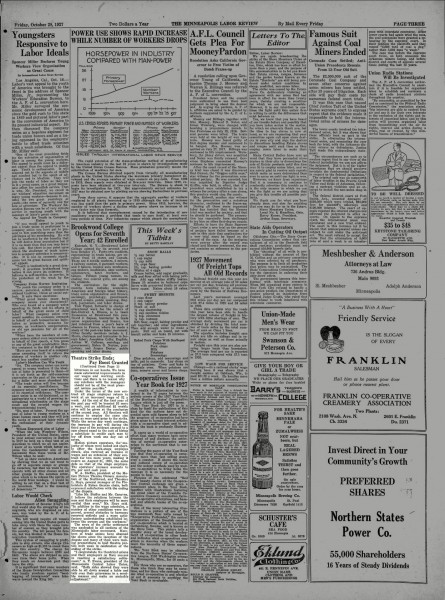| Artifact Type | Labor Newspapers, Sources |
| Publication | Minneapolis Labor Review |
| Number | X68 |
| Page Number | 1, 3 |
| Place | Minneapolis, MN |
| Publication Date | October 28, 1927 |
| Transcript | Show/Hide |
|
Headline: “Theatre Strike Ends” Subhead: Strikers to Return to Work By Sunday; Pay Boost Granted Controversy Closed at 4 A. M. Wednesday, Three-Year Contract Signed for Twin CitiesManagers and Unionists Express Satisfaction with Terms of SettlementThe theatrical strike and lockout in Minneapolis and St. Paul ended at 4 a. m. Wednesday when a three-year agreement granting an increase in wages and no reduction in the size of crews was signed by representatives of the managers’ association and the Theatrical Stage Employes and Motion Picture Operators International alliance. All Twin City theatres which have been involved in the controversy since September 18 will be operating with their former union stage hands, picture operators, musicians, scenic artists, bill posters, and transfer men not later than Sunday. Five international officers of the Theatrical Stage Employes’ union were present at the peace conference which was in continuous session from 2 p. m. Tuesday until the settlement was reached at 4 a. m. Wednesday. They were W. F. Canavan, international president, and Richard J. Green, general secretary-treasurer, both of New York City; George E. Browne, international vice president, Chicago; E. J. Tinney, Youngstown, Ohio, and Charles Crickmore, Seattle, international representatives. The conference ended with no bitterness on either side, President Canavan told the Labor Review Wednesday morning. “The settlement is satisfactory,” he said. Loyal support was given the strikers by the local labor movement and the general public during the life of the controversy. The publicity committee of the theatrical unions issued a statement Wednesday morning in which they expressed their appreciation for the stand taken by Minneapolis citizens.
Under the terms of the new contract all stage employes return to work at an increased wage of $2 a week. At the end of the first year of the pact pay will be boosted $3 more a week, and an additional $2 weekly raise will be given at the conclusion of the second year. All theatres will continue to employ the same size crews as were used prior to the strike. While the seven day week continues, the increase in pay will during the third year of the contract amount to a sum of almost equal to the cost of hiring a substitute to enable each man to lay off from work one day out of seven. Motion picture operators, the majority of whom were locked out shortly after the back-stage employes struck, also received an increase in wages and an extension of their contract for two more years, making it expire on August 31, 1930, the same date as that of the stage employes. The operators’ increase amounts to 2½ per cent each year. W. A. Steffes, president of the Motion Picture Theatre Owners Association of the Northwest, and Theodore L. Hays, general manager of the Finkelstein & Ruben theatre chain, both expressed satisfaction with the ending of the dispute. “Like Mr. Steffes and Mr. Canavan, I believe the relations between the men and their employers will be more cordial than ever,” Mr. Hays said. “In addition to the wage schedules, a number of other conditions were improved, several obstacles to harmony removed entirely and a more satisfactory understanding established between the owners and the workmen.” The news of the strike settlement was applauded in all sections of the Minneapolis labor movement. Members of trade unions have shunned the shows since the inception of the dispute and many of them were making preparations to hold theatre parties next week in celebration of ending the strike. “I congratulate the theatrical unions and their employers on their success in reaching a satisfactory settlement,” A. T. Evans, president of the Minneapolis Central Labor Union, said. “Both sides showed they were able to sit down around a table and talk over their grievances in a sensible manner and make an amicable adjustment.” |
|
| Archive | Labor Review Archive Project |
| Read In Context | http://www.minneapolisunions.org/labor_review_archive_about.php |
| Citation | “Theatre Strike Ends,” Minneapolis Labor Review, October 28, 1927. |
| Location | MinneapolisMinnesotaSaint Paul |
| Tags | |

